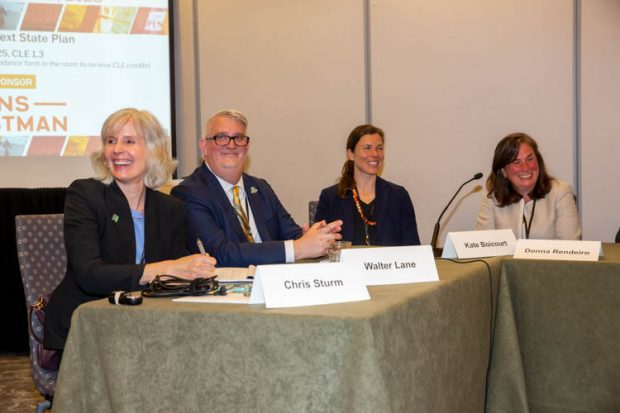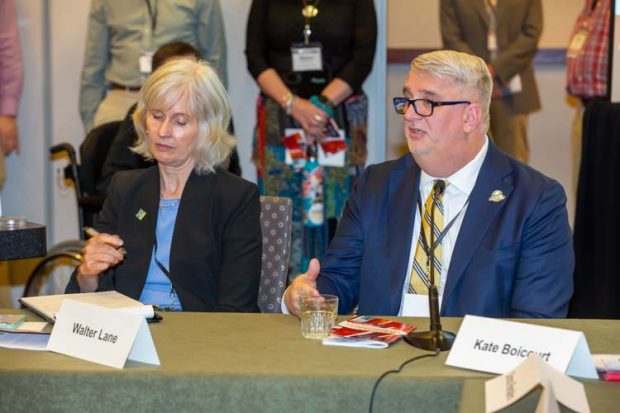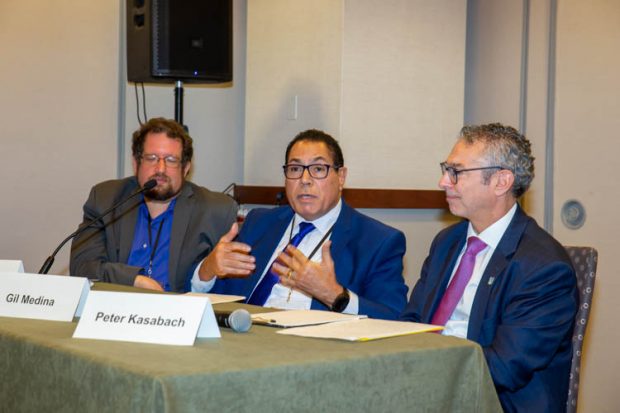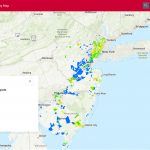New Jersey Future Blog
Launching the Next State Plan
July 18th, 2023 by Zeke Weston

Launching the Next State Plan session at the 2023 NJ Planning and Redevelopment Conference. From left to right: Chris Sturm, Policy Director, Land Use, New Jersey Future; Walter Lane, Director, Somerset County Office of Planning Policy & Economic Development; Kate Boicourt, Director, Climate Resilient Coasts and Watersheds, New York – New Jersey, Environmental Defense Fund; Donna Rendeiro, Executive Director, New Jersey Office of Planning Advocacy. Photo by Frank H. Conlon
The State Plan “is more than a guide for land-use… it’s for public health, transportation, and much more,” stated Michael Kolber, Senior Planner for the City of Trenton, during the 2023 Planning and Redevelopment Conference as a panelist on the roundtable session Launching the Next State Plan, sponsored by New Jersey Future and the New Jersey Chapter of the American Planning Association. Despite its immense importance as a guide for the state’s future growth, New Jersey’s State Development and Redevelopment Plan has not been updated since 2001. From the demographics to geography, a lot has changed over 22 years. Launching the Next State Plan explored how to best update the State Plan to better reflect the present conditions and future outlook of New Jersey.

Launching the Next State Plan session at the 2023 NJ Planning and Redevelopment Conference. State Planning Commission members in attendance included Tom Wright, Edward McKenna, Elizabeth Terenik, Stephen Santola, Bruce Harris, and Danielle Esser. Photo by Frank H. Conlon
At this standing room only session, State Planning Commissioners and session panelists outlined the opportunities provided by the first State Plan update in two decades, and engaged in a dynamic back and forth, propelling momentum for further discussions. Donna Rendeiro, Executive Director of the New Jersey Office of Planning Advocacy, and Peter Kasabach, Executive Director of New Jersey Future, served as the session’s moderators, overseeing the convening of State Planning Commission members and interested stakeholders. The panel sought to answer the following three essential questions: First, if the State Plan update is successful, what would be different in New Jersey? Second, how should the updated Plan differ from the current one? Third, how can the Plan be implemented to ensure good land use outcomes? Tom Wright, Chair of the Commission, kicked off the session by articulating the importance of the State Plan as both a policy framework and a forum for balancing planning issues. When the State Plan was last updated in 2001, it was designed to direct growth, development, and preservation decision-making, but it had almost no consideration for climate change or equity. Emphasizing and strengthening the planning and implementation processes of the State Plan are crucial to its success.

The audience engaging in launching the next state plan at the 2023 NJ Planning & Redevelopment Conference. Photo by Frank H. Conlon
Panelists recommended specific ways to address the issue of climate change in the State Plan. Walter Lane, the Director of the Somerset County Office of Planning Policy and Economic Development, explained the need to protect communities from rising sea levels, higher precipitation rates, frequent flooding, and repeated storms by incorporating climate-resilient land-use policies, transportation systems, and economies into the State Plan. Chris Sturm, Policy Director for Land Use at New Jersey Future, explained the significance of incorporating a geographic framework for climate change adaptation planning so that communities can plan earlier rather than later. Sturm suggested that the updated State Plan could designate the coastal region as a Special Resource Area and lay the groundwork for future designation of highly-developed areas that should be fortified, areas where retreat is inevitable, and areas in-between. Including climate change related goals and metrics offers a unique opportunity to bring together and utilize up-to-date data in order to establish measurable targets, explained Kate Boicourt, the Director of Climate Resilient Coasts and Watersheds in New York and New Jersey for the Environmental Defense Fund.

Walter Lane, the Director of the Somerset County Office of Planning Policy and Economic Development, speaking during the 2023 NJ Planning & Redevelopment Conference. Photo by Frank H. Conlon
Incorporating equity as a central tenet of the updated State Plan will ensure its ultimate effectiveness in improving the lives of all New Jerseyans.
The national emphasis on inclusivity and equity among government, corporations, and nonprofits provides New Jersey the opportunity to incorporate equity as a central tenet of the updated State Plan to ensure its ultimate effectiveness in improving the lives of all New Jerseyans. In particular, a concerted effort to include environmental justice in planning is overdue. This is especially true in NJ, given our state’s history of overlooking the interests of those who are most vulnerable. Kandyce Perry, the Director of the Office of Environmental Justice in the New Jersey Department of Environmental Protection, made it clear that New Jersey’s overburdened communities need to be explicitly protected from over concentrations of pollution and its effects. She identified the monumental importance of infusing environmental justice and equity into the updated State Plan. Because of the history and demographics of our state, Michael Kolber, the Senior Planner for the City of Trenton, explained that the best way to address environmental justice is through cross-municipality and regional planning. Along with climate vulnerability and concentrated pollution, New Jersey’s equity issues include housing affordability. George Vallone, the Founder and President of the Hoboken Brownstone Company, expressed concern about the lack of housing supply in the state, observing that statewide roughly 18,000 homes were for sale in May 2022, whereas only 13,000 homes were for sale by May 2023. Vallone urged the updated State Plan to make it easier and faster for housing to get built. Doing so will decrease housing costs and increase housing supply, thus reducing demand on limited housing supply and contributing to more affordable communities.

From left to right: George Vallone, Founder & President, Hoboken Brownstone Company; Kandyce Perry, Director of the Office of Environmental Justice in the New Jersey Department of Environmental Protection; Janice Kovach, Mayor, Town of Clinton during the 2023 NJ Planning & Redevelopment Conference. Photo by Frank H. Conlon
“Mayors need to be at the table and not on the menu.” Janice Kovach, Mayor of the Town of Clinton.
For a successful State Plan update, “mayors need to be at the table and not on the menu,” Janice Kovach, the Mayor of the Town of Clinton, cautioned. Kovach continued to highlight the importance of communication and coordination between state agencies and municipalities, so that all levels of government are on the same page. Boicourt agreed that there must be a two-way dialogue between municipalities and the state during the planning process. Lane suggested that Counties can play a more prominent role between the state and municipalities, explaining that counties should be more than negotiating entities for the State Plan since they are equipped to provide assistance to local communities and develop regional plans, like Somerset County’s Investment Framework. Panelists also stressed the importance of the implementation process. Gil Medina, the Executive Vice President of CBRE, insisted that the process starts and ends with the governor’s leadership. He explained that State Planning is not a partisan issue, thus every governor should understand its importance; the governor and their cabinet must be committed to implementing the updated State Plan in order for everyone else to follow suit, otherwise the process will fail.

Gil Medina, Executive Vice President, CBRE, speaking during the 2023 NJ Planning & Redevelopment Conference. From left to right: Michael Kolber, Senior Planner, City of Trenton; Gil Medina, Executive Vice President, CBRE; Peter Kasabach, Executive Director, New Jersey Future. Photo by Frank H. Conlon
The 2023 Planning and Redevelopment Conference session, Launching the Next State Plan, provided a forum for how to best update the State Plan. Incorporating climate change and equity will be immensely influential to the effectiveness and relevance of the State Plan, but so is addressing key issues regarding its structure, what it can accomplish, who will participate, and how they will participate. As this crucial planning process begins it is critical for public engagement and input; therefore Donna Reindeiro of the New Jersey Office of Planning Advocacy welcomes you to submit your comments (Stateplan comments
comments sos
sos nj
nj gov) .
gov) .
Related Posts
Tags: climate change, equity, geography, government, Land use, land use planning, state plan, State Planning
















